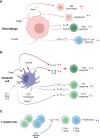The Efficacy of Cancer Immunotherapies Is Compromised by Helicobacter pylori Infection
- PMID: 35677057
- PMCID: PMC9168074
- DOI: 10.3389/fimmu.2022.899161
The Efficacy of Cancer Immunotherapies Is Compromised by Helicobacter pylori Infection
Erratum in
-
Erratum: The efficacy of cancer immunotherapies is compromised by Helicobacter pylori infection.Front Immunol. 2023 Mar 21;14:1183107. doi: 10.3389/fimmu.2023.1183107. eCollection 2023. Front Immunol. 2023. PMID: 37026018 Free PMC article.
Abstract
Helicobacter pylori infects the gastric mucosa of a large number of humans. Although asymptomatic in the vast majority of cases, H pylori infection can lead to the development of peptic ulcers gastric adenocarcinoma and mucosa-associated lymphoid tissue (MALT) lymphoma. Using a variety of mechanisms, H pylori locally suppresses the function of the host immune system to establish chronic infection. Systemic immunomodulation has been observed in both clinical and pre-clinical studies, which have demonstrated that H pylori infection is associated with reduced incidence of inflammatory diseases, such as asthma and Crohn's disease. The introduction of immunotherapies in the arsenal of anti-cancer drugs has revealed a new facet of H pylori-induced immune suppression. In this review, we will describe the intimate interactions between H pylori and its host, and formulate hypothtyeses describing the detrimental impact of H pylori infection on the efficacy of cancer immunotherapies.
Keywords: Helicobacter pylori; cancer; gut microbiota; immune checkpoint inhibitors; immunotherapy; personalized medicine.
Copyright © 2022 Oster, Vaillant, McMillan and Velin.
Conflict of interest statement
The authors declare that the research was conducted in the absence of any commercial or financial relationships that could be construed as a potential conflict of interest.
Figures


References
-
- Ahrends T, Spanjaard A, Pilzecker B, Babala N, Bovens A, Xiao Y, et al. . Cd4(+) T Cell Help Confers a Cytotoxic T Cell Effector Program Including Coinhibitory Receptor Downregulation and Increased Tissue Invasiveness. Immunity (2017) 47(5):848–61 e5. doi: 10.1016/j.immuni.2017.10.009 - DOI - PubMed
Publication types
MeSH terms
LinkOut - more resources
Full Text Sources
Medical

